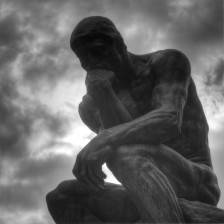I read the GTD book almost 11 years back and been implementing it for more than 5 years now. This has been the only time management system that made practical sense to me. But, to be honest, though I organized all the information into projects & contexts, I rarely checked off work as I was supposed to. Most of the time I worked only on urgent stuff making all the organisation (projects, contexts, & perspectives) pointless.
But, I did love doing a mind sweep – writing down all pending work (open loops) that were demanding my attention, having them before me to see, to decide on taking an action. This act of externalizing all thoughts in my brain was/is very freeing, bringing-in clarity, and gave me the confidence that nothing was falling through the cracks and I was considering everything.
I also love(d) writing stuff down – from quotes to thoughts to meeting notes to tasks, I capture all that I think are important. One fine day, I opened Omnifocus, my to-do manager of choice to see what I had scheduled for the day and copied them onto my notebook and started ticking them off as I completed them. This act was surprisingly effective. Omnifocus had become a burden. It became a reminder of all work that was pending and from what I was escaping. Every free minute I spent in it made me guilty. There was so much (in it) to do that I was consciously ignoring. How can I ever be productive? How I be so irresponsible? How can I ever enjoy downtime when there was so much pending to do?
Looking for tasks to be done among all those that have been pending for quite sometime became a pain. Many a times in such scenarios, I abandoned Omnifocus hoping that starting GTD in a different app was the solution; and that change would give me the energy to complete them. But of course, it was just my escapist mind thinking. Work would remain pending in the new app too.
I needed a solution. So, I started taking a look into all the pending work. I could outline my work broadly into two categories – stuff that was urgent and that I knew I had no escape from, that I knew I would do and stuff that was on my mind and would be nice to explore if and when I had the time but most likely would be the work I’d ignore.
So, I divided my task list into two broad categories – active projects & someday/maybe. Active projects would include only the stuff I had to get done and someday/maybe, the ones that I might do if I ever willed to. Also, contexts did not make sense. I spent most of the time either at office or home. And, I knew which work got done where. So, contexts were redundant. So, I eliminated them.
My active projects were very few. Probably 20 tasks in all. I decided to trim down my someday/maybe list also. When I knew that very likely I might not get them done, there was no point in maintaining huge lists. And, if at all, I did complete all my active tasks, I could anytime look into the someday/maybe list to find more tasks to work on.
I ditched Omnifocus, dumping all the existing lists and started from scratch in Todoist to give myself a chance to forget all unimportant stuff (but that were still in Omnifocus) and note down only the work that was currently on my mind and was important enough for me to remember. Also, Todoist made capturing tasks easy at work where I used a windows laptop.
Now, everyday I list down tasks from my master task lists into my notebook and work on them. Any new tasks that come up are also captured in my notebook and then later moved to Todoist at the end of the day or when I have time.
I don’t use contexts, filters or any advanced functions anymore. After doing a mindsweep, before capturing tasks on Todoist, I just try to be as intentional as possible. Only the stuff I know I will pay attention to, either now or in the future get into it and everything else is dropped without hesitation.
Why this realisation? Because over the last one year, my thought process changed. I kinda understood that there’ll always be more tasks I can ever work on, and that ‘being’ in the moment was more important than always ‘doing’ something or the other. Because today was not just a means to create a better tomorrow but was also the tomorrow I worked for, yesterday.

Reply